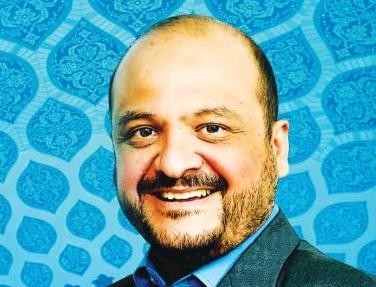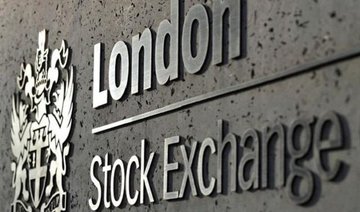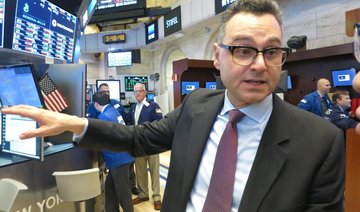HOUSTON: Ahmad Al-Khowaiter is prone to excitement. I watched him at a couple of sessions at the CERAWeek by IHS Marketing energy event in Houston Texas, and chatted to him on the sidelines.
He used the phrase “this is exciting” maybe half a dozen times in the course of a couple of hours.
He is a lucky man, for two reasons: First, what excites him is his work; and second, he is able to transmit that excitement to an audience when he explains his vision as chief technology officer of Saudi Aramco.
He told one session of a young trainee working for Aramco, who was given a job in the inspection department, which oil industry employees regard as the most boring and mundane part of the business but which all rookies must pass through.
“This student put together an inspection robot that we now use all the time in pipeline and storage work. A lot of young people don’t see a future in the oil industry, but things like this inspection robot provide them with a challenge, and also helps us solve a problem.
“I want smart people to work for Aramco, because they can help us solve problems later on down the line,” he said. Virtually all the heads in the audience were nodding enthusiastically in agreement with him.
As a scientist and chemical engineer by training, and a career employee at Aramco, he symbolizes the technocratic heritage of the company, which struck oil in Dhahran 80 years ago this week.
Amin Nasser, the Aramco CEO, told the audience how the strike came about because of an “incredible partnership” between an American geologist, Max Steineke, and his Bedouin guide, Khamis Ibn Rimthan, “who always seemed to know where to go next.”
Al-Khowaiter provides continuity for the partnership between American expertise and Saudi resourcefulness. A graduate of the King Fahd University of Petroleum and Minerals in Dhahran, he completed a master’s degree at the University of California, and now moves comfortably between Aramco’s Dhahran HQ and America’s oil capital, Houston, where the company has a big R&D business.
That is one of a global network of Aramco technology hubs that span the world, taking in other centers in the US, in Europe, the Middle East and Asia. Technology employs 1,300 people out of a global workforce of 60,000.
“I don’t look on technology as a silver bullet to solve business problems, but I do want to know how you integrate it into business strategy,” he said.
Technology is one of the key areas of the modern Saudi Aramco, and a significant item in the $40 billion of capital expenditure to which it is committed every year for the next decade across upstream, downstream and sustainable projects.
I want smart people to work for Aramco, because they can help us solve problems later on down the line.
Ahmad Al-Khowaiter
There is some historical perspective. Once climatic and logistical problems were overcome in the search for Saudi crude, the actual process of getting oil from the ground was not that difficult, because it was so plentiful and relatively accessible, either onshore or in shallow coastal offshore areas. Saudi costs of production are among the lowest in the world.
But in the 21st century, an oil company, even one with the vast reserves of Aramco, has to be more than just a gigantic petrol pump. Aramco has an obligation to Saudi citizens to prolong the life of its reservoirs as long as possible, and a duty to the rest of the world to produce oil as cleanly and efficiently as possible.
Technology is the key to achieving both, Al-Khowaiter believes. On reservoir management, he waxed lyrical about Aramco’s capabilities. “The most exciting stuff is basin and reservoir simulation. It tells you how to optimize production and prolong the life of the well. We have the data for the entire Arabian peninsula fields,” he said.
Advanced reservoir modeling technology tells technicians exactly how much oil is contained in and flowing from any particular well, while recovery is improved by smart water flood techniques, chemical enhancement and surfactant nanoparticles, which Al- Khowaiter also finds “exciting.”
The other word he uses a lot is “efficiency,” and that seems to be the new watchword of the oil industry. For financial as well as environmental reasons, oil can no longer be simply pumped, refined and consumed.
It has to be made clean, its byproducts have to be controlled and exploited, and it has to be used for more than just fuel for internal combustion engines.
Emissions of carbon dioxide (CO2), in particular, have to be minimized, and this is a big focus of Al-Khowaiter’s work. He, and CEO Nasser, took a lot of corporate pride from a recent scientific study that showed Aramco crude to be the cleanest supplier — in terms of low CO2 emissions — to China, the biggest oil consumer in the world. It was partly down to the quality of Saudi crude, but also to the efficiency of Aramco’s production techniques.
“The energy management program is aimed at improving efficiency. It is good business, not just environmental practice. We are the lowest cost producer and the lowest emissions producer, which is a good combination,” he said.
Another big focus is on how to make best use of the byproducts of oil production, most notably gas. For the first several decades of its existence, Aramco used to flare gas, but now it is seeking to actively build its gas output and use it to fuel domestic Saudi consumption, saving the precious crude for export.
But perhaps the biggest strategic step Aramco is taking is in relation to the move away from use of oil just as a fuel.
One way of doing this is to convert it directly to petrochemicals, which enables it to move to higher value added products in virtually every aspect of modern industry, from plastics to medicines to building and construction products.
“We want to go directly from oil to chemicals, skipping the refining process, which nobody else has done. We want to have much higher conversion rates of crude to non-fuel,” he said.
There is also a lot of potential in changing the nature of fuel itself. Oil used in transportation — motor vehicles, airplanes and ships — accounts for 57 percent of total global consumption, and by far the largest proportion of damaging emissions, so any improvement there will have immediate effects.
“We’ve been using it (oil as fuel) for more than 100 years now, but I was shocked by the potential to make fuels more efficient. Until now, we’ve just given fuel to the motor manufacturers virtually as we’ve found it in the ground. Fuels like diesel and gasoline were more or less accidents of history, but scientists know now that there is something better. There is a lot of value in optimizing fuel efficiency,” he said.
You have to meet the demand for energy, and simultaneously also reducing emissions. We look for those solutions
Ahmad Al-Khowaiter
Motor manufacturers should work with the oil companies, he believes, to produce more efficient ways to use oil as fuel. The traditional spark-plug based internal combustion engine is flawed, with only 30 to 35 percent efficiency. “Just moving from spark plugs to compression engines improves efficiency dramatically,” he said.
Al-Khowaiter caused a stir earlier this year at the Detroit Motor Show, where he led an Aramco team for its first-ever visit to the quintessential motor industry event, and explained to automakers the need for a new approach to engine design and manufacture. Aramco also has an R&D hub in Detroit.
In collaboration with Achates Power, an American company designing a new generation of compression engines, Aramco is promoting the advanced fuel engine to rival other new technologies, like electric vehicles.
“In an era of climate change concerns, battery electric vehicles have become a symbol of innovation, promising to disrupt the automotive industry. Yet hidden in plain sight are some of the most disruptive technologies the industry has ever seen; and they happen to be new and improved internal combustion engine,” Al-Khowaiter said.
He is not writing off the renewable sources, however, and on the contrary said: “I’m a big believer in renewables.”
Aramco produces a lot of “exciting” hydrogen at its plants, but the problem is in logistics and transportation, which is very expensive; solar is becoming economically viable, but the problem there is storage. Al-Khowaiter’s team is working hard on both issues.
The applications of artificial intelligence to the energy industry is another “exciting” area, though he admitted Aramco hadn’t quite mastered that yet.
“But we want to be on the leading edge of that,” he said.
He said that one of his “favorite topics” was the question of closing the carbon cycle, which would mean eliminating all carbon emissions into the atmosphere and end the threat from greenhouse gasses completely. But, while Aramco has put a lot of work into carbon capture and storage for motor vehicles, science is not appreciably nearer that particular goal.
Other more practical problems are solvable, though. Al-Khowaiter’s team spent a long time looking at the mechanics of the process of corrosion, which is a serious problem for an organization that uses a lot of metal in the very inhospitable environment of the Arabian desert.
Though they made some “exciting” discoveries, he admitted: “In the Arabian desert, you can never really solve the problem of corrosion, so we’re looking at developing and deploying non-metallics. We’re planning to add thousands of kilometers of non-metallic pipes,” he said.
On a personal level, he would appreciate the benefits of that. He recalled his first job — inevitably in inspection. “Crawling through a metal tower in the August heat in Saudi Arabia. If you’re claustrophobic, you don’t really want to do that,” he said.
The CERA audience, who by now had caught his infectious enthusiasm for science and for Saudi Aramco, laughed out loud in their excitement at that story.
So, technology is a business tool for Aramco, and it is also part of the company’s drive toward sustainability. But can an oil company ever be a truly sustainable organization? “Well, our actions speak louder than words. Oil and gas is the only industry that is really contributing to CO2 reductions, and we are playing a big part.
“You have to meet the demand for energy, and simultaneously also reducing emissions. We look for those solutions. That energy is down there, and we will figure out how to get it out with the fewest emissions,” Al-Khowaiter said.
As a scientist and chemical engineer by training, and a career employee at Aramco, Ahmad Al-Khowaiter symbolizes the technocratic heritage of the company, which struck oil in Dhahran 80 years ago this week.



























